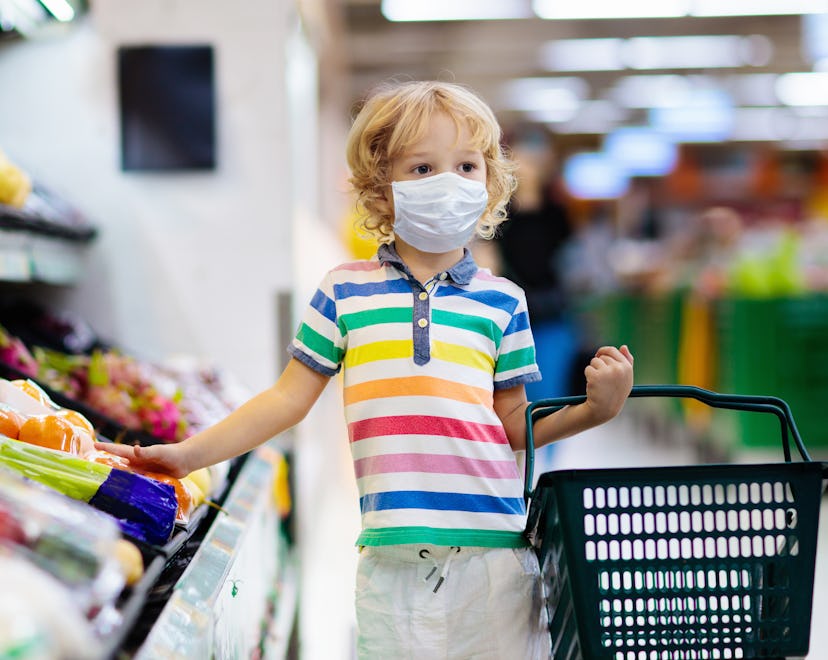Coronavirus

Your Kids Are Listening To Your Covid Talk
So it’s important to remember it’s not March 2020 anymore.
The first week back from winter break is never easy for parents, but this one has been particularly intense. Here’s how I’ve seen it described in my various feeds:
“It’s like sending kids into a war zone.”
“It’s March 13, 2020 all over again.”
“This is the nightmare that never ends.”
Yes, Covid has had us in its grip for far longer than any of us imagined, but for me, the nightmare that never ends is the ebb and flow of parental anxiety. The nightmare that never ends is the boiling point, when parents are furious with each other because one parent is fine sending their kid to ballet with a mask on and the other one believes the entire education system should be replaced with GoNoodle videos until we go six months globally without a single covid case.
The nightmare is, our kids are listening.
How we discuss the current surge in cases, how we continue to talk about the pandemic, will determine how our children react.
Our kids hear us panicking about school closures, about missed activities, about rescheduled vacations. Our kids hear our fear about breakthrough cases, about pediatric hospitalization rates, about KN95 masks. Our kids hear our judgment about other parents, about day cares staying open, about neighbors walking outside without a mask on, about unvaccinated people who get sick and die.
If your kid were to catch omicron, how would they feel? Scared? Anxious? Grateful for a vaccine that keeps their sniffles just a mild inconvenience? Nobody wants their kid to be sick — nobody wants their child to have even a tickle in their throat. But how we discuss the current surge in cases, how we continue to talk about the pandemic, will determine how our children react. Will your child feel guilty that they tested positive? Will they start casting blame on an outdoor playdate from a week ago as the place they got it?
What if someone your child loves is diagnosed with Covid-19 — will they feel sympathy? Will they feel fear? Will they look at their aunt or uncle or babysitter and blame them for catching omicron? Will your child blame them for the reason they now have to get tested? Will your child suddenly wrestle with judgement and the urge to moral condemnation because of what they’ve heard at home?
Parents are not OK, but it’s a different version of not OK. It’s not the paralyzing anxiety of March 13, 2020 anymore, fear of a menacing unknown — it’s the whiplash from changing guidance and shifting risks. It’s the queasy duality of loving our schools and our teachers and wanting them to be safe and supported, but also really wanting our kids to enjoy second grade in a bright classroom instead of the blue glow of Zoom. It’s feeling judged because we know our neighbors think we’re lunatics for putting our kids in an outdoor soccer camp, but also feeling a rush of adrenaline at our kid’s happy, sweaty faces when it’s over.
We cannot let ourselves be yanked back to the anxiety and crushing stress of the beginning of the pandemic.
It’s not March 13, 2020 all over again; this isn’t a war zone. There are so many more tools in place than there were at the very beginning of the pandemic, and there are so many things we know now that we didn’t before. Like, yes, omicron is highly contagious, but also most people who contract it have symptoms they can treat at home and fairly quickly. Children ages 5 and up can be vaccinated, which means even if they do catch omicron, they are protected from severe illness — and the terrifying specter of “long covid” is dramatically reduced by vaccines. Cases are skyrocketing, but hospitalizations and deaths are not.
Things are scary, yes. The uncertainty is scary; the fact many children who aren’t old enough for a vaccine have to go to day care centers without a vaccine mandate for teachers is scary. But things are not as scary as they were back in March 2020. Things have changed, policies have been implemented, and while testing is still a mess and government support is pretty much nonexistent (and when, oh when, will those vaccines for kids under 5 show up?), we cannot let ourselves be yanked back to the anxiety and crushing stress of the beginning of the pandemic.
If you want to go back to March 2020, aim for the part where your family worked on a puzzle every night during the week. Where you replaced screen time in the evenings with a family walk. Where you ordered takeout and skipped the dining-in portion. Where you spent more time outside with those you love — those who are most likely vaccinated by now!
Remember that vaccines for kids under 5 are coming. Remember that this surge won’t last forever. Remember that you are in charge of the decisions made for your family and only your family.
And remember that your kids are listening.